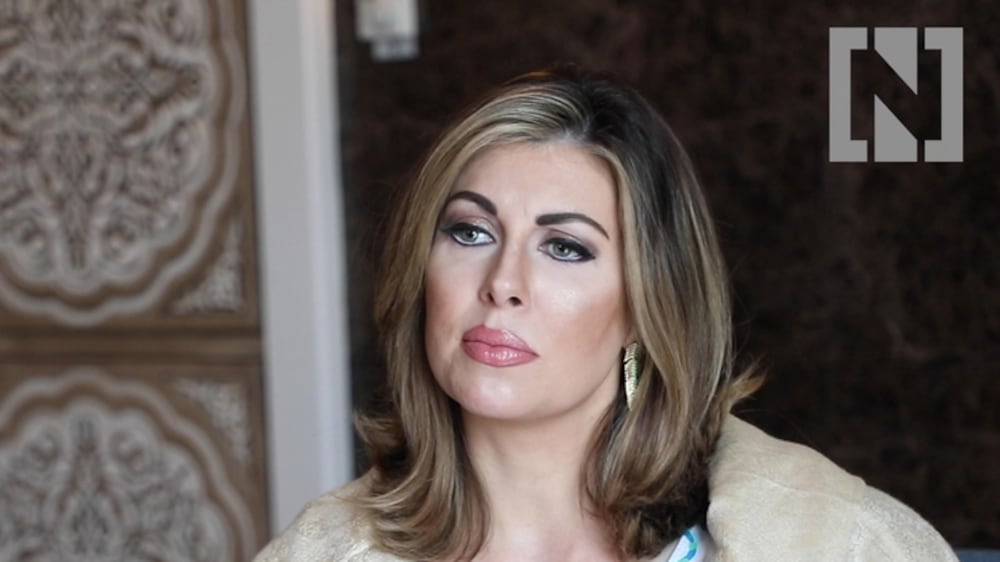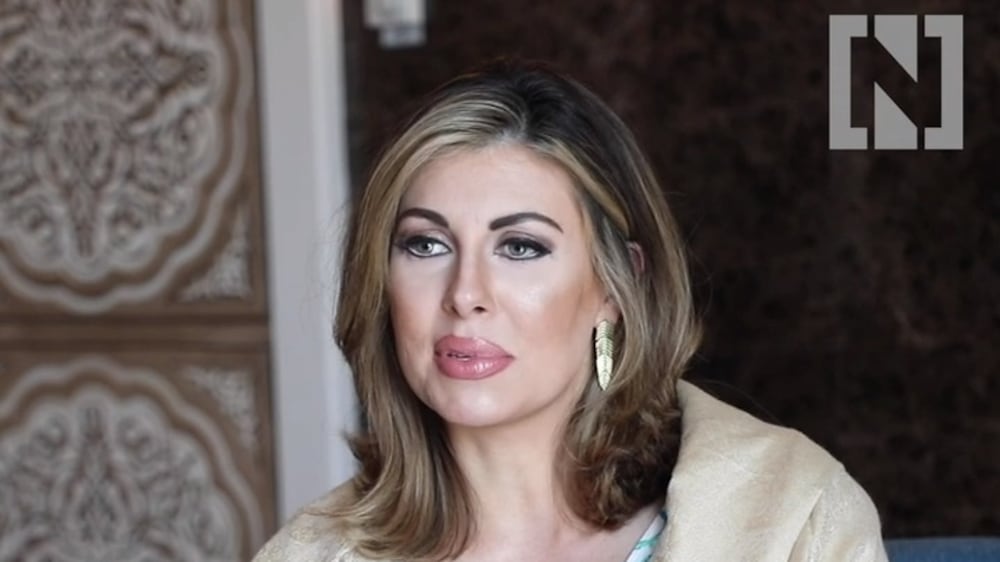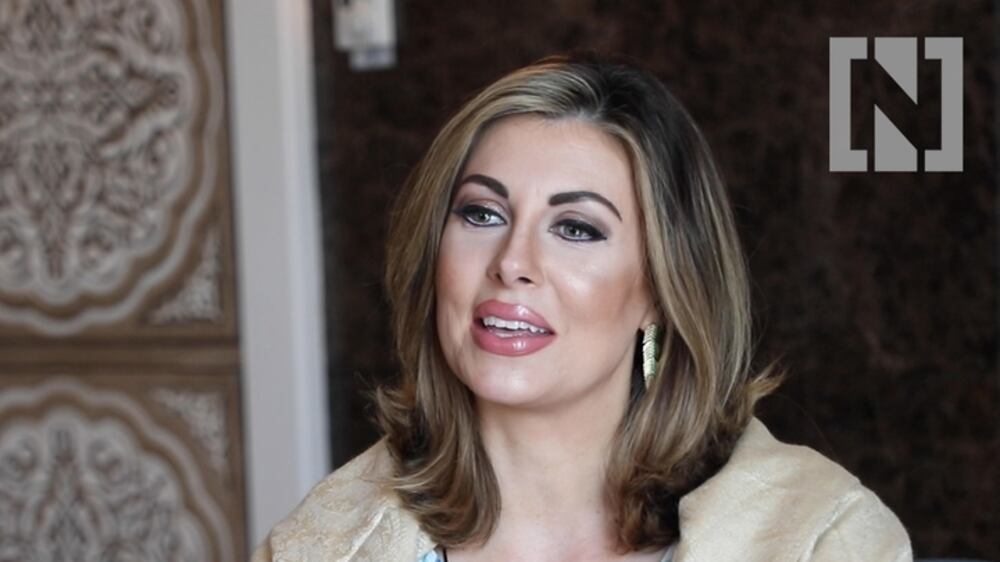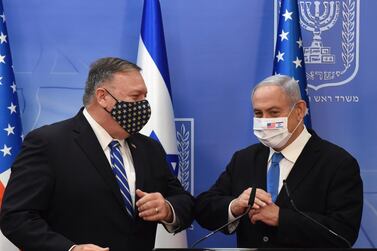The announcement that the UAE and Israel will work towards normalising relations will "hopefully change attitudes and sentiments" in the region that there can be ties despite disagreements, US State Department spokeswoman Morgan Ortagus told The National on Wednesday.
Shortly after Secretary of State Mike Pompeo arrived in the UAE on his first regional tour following the August 13 announcement between the US, the UAE and Israel regarding relations, Ms Ortagus praised the “historic” agreement.
“We know this is the first agreement in 25 years [between an Arab state and Israel],…it's always hard to be the one to go first and I think it took a lot of courage, a lot of bravery from the UAE,” she said.
She said the move would boost US policy in the region that two “important allies” now have ties but that influence would go beyond politics.
“From a diplomatic perspective, this is obviously wonderful and historic and great, but when you look at it also from an economic perspective, from a technology perspective, I think this will really hasten the partnership between Israel and the UAE,” she said. “Both the UAE and Israel have such a technology edge, they're real technology leaders in the region.”
On a personal level, Ms Ortagus said she felt lucky to have been a part of the move. “I know I'm living a part of history,” she said.

But she hoped that the support towards the move shown by several other Arab states would help offset those, such as Iran and Turkey, that had strongly opposed the deal.
Iran on Tuesday again issued military threats against the UAE for announcing relations with Israel. The inclusion in the August 13 announcement of increased UAE-US military co-operation was also intended to improve stability and security in the region.
US-UAE Military Co-operation
“We know that the UAE has been there on the frontlines of dealing with an aggressive [Iranian] regime that will – instead of taking the opportunity to look at peace between UAE and Israel – threaten military violence against UAE for making peace. I think that that speaks volumes,” she said.
“So that's why it's been a policy of this administration to send more US troops to the region when we needed to support Saudi Arabia or UAE… and this is why it will continue to be a policy to militarily bolster the UAE.”
On the particulars of that relationship, she simply said that the US has been working on defence with the UAE since the First Gulf War in the early 1990s and would continue that co-operation.
US State Department: US will continue to provide military support to UAE

On Tuesday, Ms Ortagus criticised a meeting between Turkey’s President Erdogan and Ismail Haniyeh, head of Hamas’ political bureau, and an accompanying delegation in which the Gaza-based group called for Ankara to block other states building ties with Israel, despite Turkey’s long standing diplomatic and economic relationship with Israel. Haniyeh is a US-designated terrorist.
On Tuesday’s comments about a Nato ally, she said, “it can be tough and challenging when you have major disagreements with friends… But meeting with Hamas was just something that we felt like that could not go unanswered.”
A new relationship with Iraq
Mr Pompeo and Ms Ortagus’ visit to the region comes days after Iraqi Prime Minister Mustafa Al Kadhimi travelled to Washington to meet with US President Donald Trump and discuss the future of Iraq-US relations.
Ms Ortagus said that right now, Iraq-US relations are in “such a different place than I would have thought” just a few months ago.
US State Department: US has a new relationship with Iraq

She described how she spent New Year’s Eve in the State Department operations centre working “24/7” as Iran-backed militias and protesters tried to storm the US Embassy in Baghdad.
“It was a pretty crazy time,” she said. “And fast forward, we have now had our second strategic dialogue between Iraq in the United States… so we think that we are really moving towards a new phase and our relationship with Iraq. It's becoming a much more sophisticated relationship.”
She said the administration in Washington wants to support Mr Al Kadhimi in bringing change to Iraq after months of protests at the stagnation and corruption that has seen public services deteriorate and unemployment rise over the last nearly two decades since the 2003 invasion.
“We're all really hopeful a new administration in Iraq always brings the promise of hope and a different life. This is what the Iraqi people themselves have been asking for and this is what they deserve,” she said to the protesters who have been demonstrating since October despite over 500 being killed by security forces and militias.
On recent US-Iraq business deals, she said the administration would “continue to push for transparency and accountability” to ensure the Iraqi people see improvements.
“Iraqi people want transparency, they demand openness, they demand reforms, and, so far, the government seems willing to meet the Iraqi people where they want and we will continue very much to aggressively support the Iraqi people in that effort,” she said.
Lebanon needs reforms
Lastly turning to Lebanon following a deadly blast on August 4 that killed over 170 people, wounded 6,000 and left much of the capital destroyed, she said that real government reform was needed.
Lebanon was already facing the worst economic crisis in its history and mass street protest even before August 4.
Ms Ortagus said that for the last two years “one of [Mr Pompeo’s] primary missions has been to push the Lebanese government for reforms”.
She said that with Mr Pompeo, Under Secretary of State for Political Affairs David Hale (a former Lebanon ambassador) and Assistant Secretary of State for Near Eastern Affairs David Schenker, “we often joke that we have three very senior Lebanon desk officers [as]… three of our most senior officials, so they are very attuned to what's going on in Lebanon.”
The US dispatched FBI officers to assist in the probe into the August 4 blast and she said the “United States government will do everything that we can to support an independent investigation. And that's what the Lebanese people deserve.”







